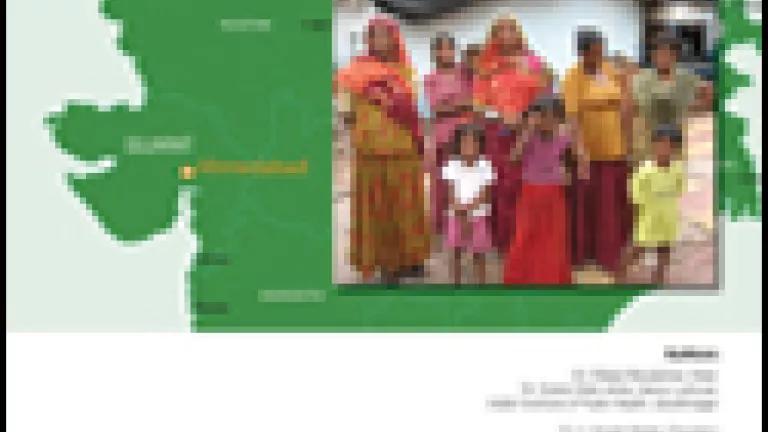New Report: Climate Change and Health Preparedness in India: Protecting Local Communities in Ahmedabad, Gujarat from Extreme Heat

In Ahmedabad this past week, we saw temperatures rises to 104oF (40oC) – and it’s only March. As the extreme heat season looms ahead, predicted temperature averages far exceed 100oF (38oC) in western India. Continuing work to address Ahmedabad’s climate change challenges, NRDC, the Public Health Foundation of India (PHFI), the Indian Institute of Public Health-Gandhinagar (IIPH), along with local partners in the city of Ahmedabad and the Mount Sinai School of Medicine, held a Heat Sensitization Workshop primarily for the local healthcare sector. At the workshop convened by the Ahmedabad Municipal Corporation, we released our joint report Climate Change and Health Preparedness in India: Protecting Local Communities in Ahmedabad, Gujarat from Extreme Heat. We also shared experiences amongst medical professionals on clinical treatments and preventive measures to protect the poorest communities from extreme heat.
Our newly-released health report details municipal and health care sector actions and critical elements necessary for an effective health vulnerability assessment for the city of Ahmedabad. Our report describes the framework for Heat Health Vulnerability Assessment implementation, challenges and opportunities for health sector and municipal government, and expert recommendations of specific activities to be accomplished. Much of the discussion in the report is based on our findings during our 2011 Heat Health Workshop on ongoing work.
Heat-Health Vulnerability Assessment in Ahmedabad
Extreme heat in Ahmedabad has aggravated and increased instances of malnutrition, water scarcity, diarrheal illnesses, dengue fever, chikungunya, malaria, dehydration and various forms of heat exhaustion. In addition to these health effects, Ahmedabad’s 2010 heat wave emergency resulted in increased air, water and soil pollution, exacerbated by a lack of citizen awareness regarding pollution prevention. Ahmedabad municipalities, health officials, and national governments are mandating early action to protect the human health of their community. Our report explains the following framework for a Heat-Health Vulnerability Assessment:
- Identifying the scope of the Vulnerability Assessment
- Assessing local climate-health vulnerability
- Assessing local climate-health impact
- Assessing means and capacity for climate-health adaption
In order for a heat –health vulnerability assessment to be successful and actionable, it must be adapted to local needs. This report identifies three methods of gathering local data in order to provide an analysis that classifies vulnerability to extreme heat into factors affecting exposure, susceptibility, and adaptive capacity. Heat-health related scientific studies conducted in West Bengal, Gujarat, and in the United States (specifically, Arizona, California, and New York) are highlighted in the report.
Challenges and Opportunities
Ahmedabad’s health care system unfortunately has limited capacity to recognize, diagnose, and treat heat-related illnesses. Underreporting of heat-related illness, insufficient death records that do not list patient’s occupation or address, and inadequate cooling systems within hospitals are a few challenges contributing to the problem. This report identifies ways for the health sector to respond effectively, including by holding trainings for healthcare workers and doctors, launching public awareness campaigns when the Ahmedabad Health Commission Medical Information System (MIS) reports high incidence of mortalities, and utilizing health practitioner networks to train and educate employees how to address heat vulnerability.
The Ahmedabad Municipal Corporation (AMC) and the Met Department face similar limitations in capacity and organization. This report highlights municipal government opportunities to improve adaptive capacity in education and awareness, infrastructure, architecture,, and occupational resilience. Adopting these methods will allow the AMC to develop an effective Heat Health Early Warning System that overcomes current challenges of insufficient weather prediction, information, and monitoring.
Expert Recommendation to Address Health Vulnerabilities to Climate Change
During the March 2011 Heat-Health Vulnerability Workshop held in Ahmedabad, more than 40 expert scientists, municipal and state administrators, and health officials developed specific recommendations to address heat-health vulnerability. The report details short-term and long-term actions to be taken in the following areas:
- Building engagement and capacity-building within government agencies
- Assessing heat-vulnerable communities in Ahmedabad
- Assessing current adaptive capacity in Ahmedabad
- Implementing adaptation interventions
Following our March 2011 workshop and communication with the AMC, Ahmedabad officials have taken significant steps to protect communities from extreme heat. Our report lists the “Top Ten Initial Steps” that should be taken immediately to protect Ahmedabad citizens.
Looking Ahead
PHFI, IIPH, and NRDC, along with the AMC and the local community are continuing to expand research and outreach on extreme heat. Looking forward, we will engage further with community leaders to develop an actionable Heat-Health Early Warning System and strategies to protect local populations, provide heat-risk reduction outreach to identified vulnerable populations, and conduct a best-practices workshop to train medical providers, high-risk occupations, and community leaders.
This health report, while specific in research and analysis to Ahmedabad, provides a roadmap for any community to conduct their own vulnerability assessment that tailors heat preparedness programs to protect residents and help residents adapt to the drastic effects of climate change.
(Co-Authored by Neha Mathew, NRDC Academic Intern)
